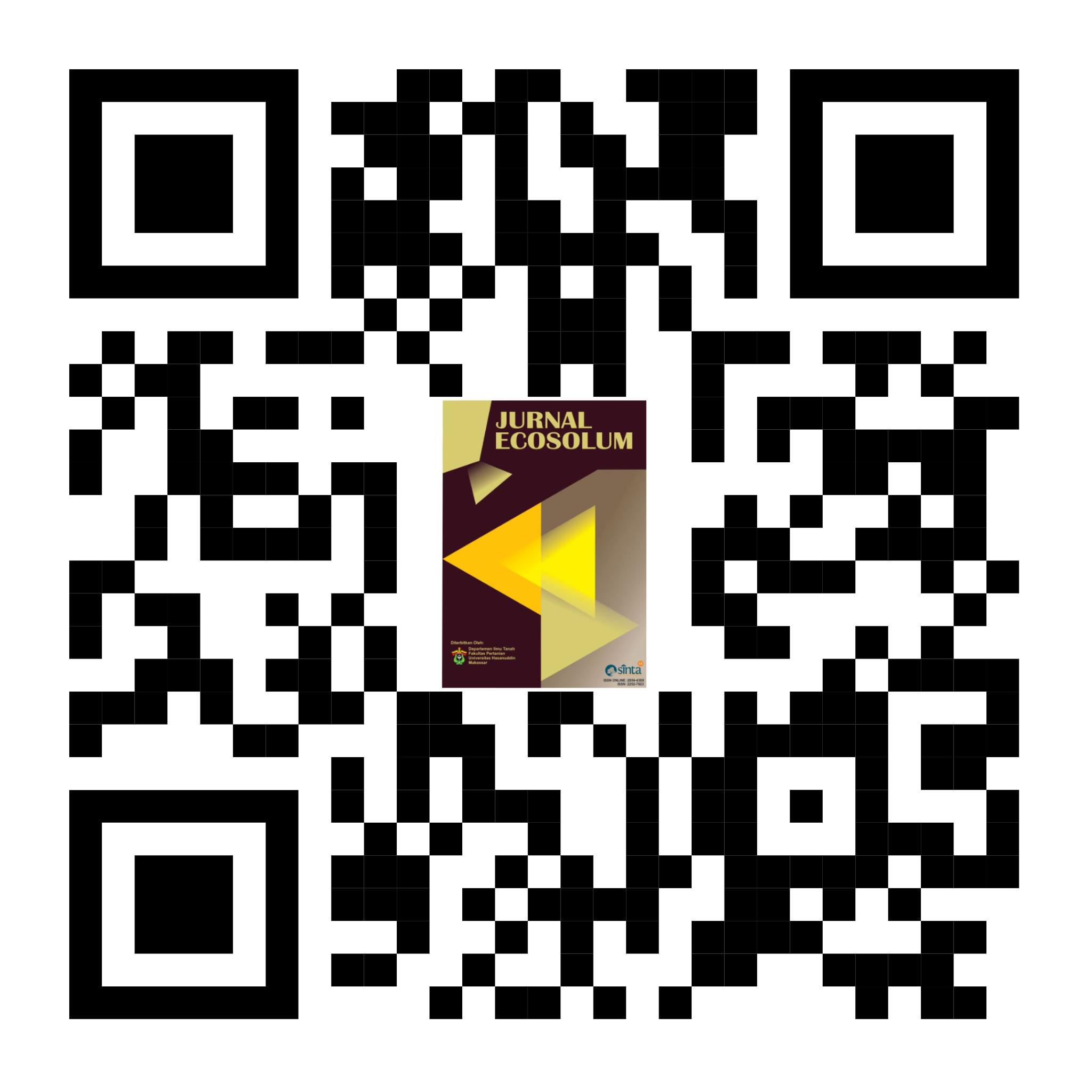Identifikasi Status Hara Tanah pada Lahan Kering sebagai Dasar Pemupukan Kedelai di Kecamatan Andoolo Kabupaten Konawe Selatan
DOI:
https://doi.org/10.20956/ecosolum.v8i2.7796Keywords:
nutrient status, soil fertility information, recommendation, soybeanAbstract
Soybean is a potential type of legume plant to be developed in Andoolo District, South Konawe Regency. However, the soybeans production is still relatively low. The main problem in the low production of soybeans is the unavailability of information on soil fertility status, especially the status of organic C-nutrients, P and K. Therefore information on soil nutrient status is very necessary. The study was conducted in the village of Ataku, Andoolo District, South Konawe Regency in May to July 2018 using the Dry Soil Test Equipment (PUTK) method. There were 27 soil samples taken randomly to obtain soil nutrient status including organic matter, P, K and soil pH and recommendations for soybean fertilizer dosages in the Andoolo District. The results of this study showed that C-Organic status, P, K and pH in Andoolo District varied. Based on the results of the analysis, the recommended fertilizer dosage in Andoolo District is giving 2 tons/ha of organic matter plus 200 kg/ha of Urea fertilizer, 200 kg/ha of SP36, and 100 kg/ha of KCl for low K status, 75 kg/ha of KCl for moderate K status and 50 kg/ha of KCl for soil with high K status. For soil with a very acidic and acidic pH status, it is recommended to give 500 kg/ha of lime doses to increase the soil pH to neutral conditions.
References
BPS. 2017. Andoolo dalam Angka 2017. BPS Kab. Konawe Selatan.
Balitkabi. 2016. Deskripsi Varietas Unggul Aneka K dan Umbi. Balitbangtan. Jakarta
BPS. 2017. Kabupaten Konawe Selatan dalam angka 2017. Badan Pusat Statistik. Kendari
Dierolf. T, T. Fairhurst, E. Mutert. 2001. Soil Fertility Kit: A tool Kit for Acid, Upland Soil Fertility Management in Southeast Asia. PT Jasa Katom; and Potash & Phosphate Institute (PPI). Canada.
Engelstad, O.P. 1997. Teknologi dan Penggunaan Pupuk. Gadjah Mada University Press.
Fi’liyah, Nurjaya, Syekhfani. 2016. Pengaruh Pemberian Pupuk KCl terhadap N, P, K tanah dan serapan tanaman pada Inceptisol untuk Tanaman Jagung di Situ Hilir, Cibungbulang, Bogor. Jurnal Tanah dan Sumberdaya Lahan Vol. 3 No. 2 :329-337, 2016.Bogor.
Prasetyo B.H dan Suriadikarta D.A. 2006. Karakteristik, Potensi dan Teknologi Pengelolaan Tanah Ultisol untuk Pengembangan Pertanian Lahan Kering di Indonesia. Jurnal Litbang Pertanian, 25 (2). Jakarta.
Rosmanah S, Wibawa W dan Siagian I.C. 2012. Status Hara Tanah Sawah di Kabupaten Kepahiang berdasarkan hasil analisis Perangkat Uji Tanah Sawah (PUTS). Prosiding BPTP Bengkulu.
Sanchez, P.A. 1976. Properties and Management of Soils in The Tropics. A. Wiley-Interscience Publication. John Wiley and Sons. New York.
Setyorini D, Nurjaya, Widowati L.R, Kasno A. 2015. Petunjuk Penggunaan Perangkat Uji Tanah Kering (Upland Soil Test Kit versi 1.0). Balai Penelitian Tanah. Balitbangtan. Jakarta
Sutedjo. M.M. 2002. Pupuk dan Cara Pemupukan. Rineka Cipta. Jakarta.
Sudaryono. 2009. Tingkat Kesuburan Tanah Ultisol pada Lahan Pertambangan Batubara Sangatta Kalimantan Timur. Jurnal Teknik Lingkungan Vol.10 No.3 Hal 337-346. Jakarta
Supangat A.B, Supriyo H, Sudira P, Poedjirahajoe E. 2013. Status Kesuburan Tanah di Bawah Tegakan Eucalyptus Pellita F. Muell : Studi Kasus si HPHTI PT. Arara Abadi, Riau (Soil Fertility under Eucalyptus pellita F Muel stands: Case study in PT. Arara Abadi, Riau). Jurnal Manusia dan Lingkungan, Vol. 20 No. 1, Maret 2013:22-34.
Supriyadi S. 2008. Kandungan Bahan Organik Sebagai Dasar Pengelolaan Tanah di Lahan Kering Madura. Jurnal Embryo Vol.5 No. 2 tahun 2008. Madura.
Utami S.N.H, Handayani S. 2003. Sifat Kimia Entisol pada Sistem Pertanian Organik. Jurnal Ilmu Pertanian Vol. 10 No. 2, 2003: 63-69.











